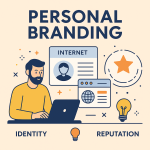Title: Why Personal Branding is the Key to Career Success in 2025 and Beyond
Category: Career Development / Personal Branding
Tags:
personal branding, career growth, linkedin, digital identity, professional development, freelancing, 2025 success strategies, career tips, brand yourself, job market
Why Personal Branding is the Key to Career Success in 2025 and Beyond
In today’s digital-first world, your resume isn’t the only thing that speaks for you—your personal brand does too. Whether you're a student, entrepreneur, freelancer, or corporate employee, personal branding is no longer optional. It’s a strategic necessity that can open doors, build credibility, and create opportunities that a degree or experience alone can’t.
What Is Personal Branding?
Personal branding is the intentional effort to influence public perception by positioning yourself as an authority in your industry, elevating your credibility, and differentiating yourself from the competition. In simpler terms, it's how you present your skills, values, personality, and mission to the world—both online and offline.
Why Personal Branding Matters
1. Opens Career Opportunities
Recruiters often search LinkedIn or other platforms before calling you. A strong personal brand builds trust before the first conversation.
2. Builds a Network
People connect with people—not resumes. A clear and authentic brand draws mentors, collaborators, and industry professionals to you.
3. Increases Confidence
Knowing who you are and what you stand for helps you speak with clarity, pitch yourself better, and lead with purpose.
4. Enhances Visibility
In a saturated market, people don’t remember the best—they remember the most visible. A strong brand ensures you're the go-to name in your niche.
How to Start Building Your Personal Brand
1. Define Your “Why”
Ask yourself: What do I want to be known for? What is the problem I want to solve? Your purpose drives your branding.
2. Optimize Your Digital Presence
Ensure your social media profiles (especially LinkedIn) reflect your professional tone, achievements, and goals. Use a consistent photo, bio, and banner image across platforms.
3. Content is Your Currency
Start sharing content around your expertise. It could be in the form of blog posts, reels, carousels, or micro-articles. Don’t just consume—contribute.
4. Engage With Your Industry
Follow relevant pages, join discussions, attend webinars, and leave meaningful comments. Personal branding is also about who sees you showing up consistently.
5. Tell Your Story
People resonate with stories more than achievements. Share your journey, struggles, lessons, and breakthroughs.
Real-Life Examples
Think of how people like Ankur Warikoo, Raj Shamani, or even local creators built massive followings just by being authentic, consistent, and helpful. You don’t need millions of followers—you need clarity, consistency, and value.
---
Conclusion
In 2025, people are hired not just for what they know but for who they are and how they communicate their value. Whether you want to freelance, land a dream job, or grow a business, personal branding will be your biggest asset.
Don’t wait for opport
unities—create them by showing the world who you are.
Cheshtha purohit
25-5-2025
Category: Career Development / Personal Branding
Tags:
personal branding, career growth, linkedin, digital identity, professional development, freelancing, 2025 success strategies, career tips, brand yourself, job market
Why Personal Branding is the Key to Career Success in 2025 and Beyond
In today’s digital-first world, your resume isn’t the only thing that speaks for you—your personal brand does too. Whether you're a student, entrepreneur, freelancer, or corporate employee, personal branding is no longer optional. It’s a strategic necessity that can open doors, build credibility, and create opportunities that a degree or experience alone can’t.
What Is Personal Branding?
Personal branding is the intentional effort to influence public perception by positioning yourself as an authority in your industry, elevating your credibility, and differentiating yourself from the competition. In simpler terms, it's how you present your skills, values, personality, and mission to the world—both online and offline.
Why Personal Branding Matters
1. Opens Career Opportunities
Recruiters often search LinkedIn or other platforms before calling you. A strong personal brand builds trust before the first conversation.
2. Builds a Network
People connect with people—not resumes. A clear and authentic brand draws mentors, collaborators, and industry professionals to you.
3. Increases Confidence
Knowing who you are and what you stand for helps you speak with clarity, pitch yourself better, and lead with purpose.
4. Enhances Visibility
In a saturated market, people don’t remember the best—they remember the most visible. A strong brand ensures you're the go-to name in your niche.
How to Start Building Your Personal Brand
1. Define Your “Why”
Ask yourself: What do I want to be known for? What is the problem I want to solve? Your purpose drives your branding.
2. Optimize Your Digital Presence
Ensure your social media profiles (especially LinkedIn) reflect your professional tone, achievements, and goals. Use a consistent photo, bio, and banner image across platforms.
3. Content is Your Currency
Start sharing content around your expertise. It could be in the form of blog posts, reels, carousels, or micro-articles. Don’t just consume—contribute.
4. Engage With Your Industry
Follow relevant pages, join discussions, attend webinars, and leave meaningful comments. Personal branding is also about who sees you showing up consistently.
5. Tell Your Story
People resonate with stories more than achievements. Share your journey, struggles, lessons, and breakthroughs.
Real-Life Examples
Think of how people like Ankur Warikoo, Raj Shamani, or even local creators built massive followings just by being authentic, consistent, and helpful. You don’t need millions of followers—you need clarity, consistency, and value.
---
Conclusion
In 2025, people are hired not just for what they know but for who they are and how they communicate their value. Whether you want to freelance, land a dream job, or grow a business, personal branding will be your biggest asset.
Don’t wait for opport
unities—create them by showing the world who you are.
Cheshtha purohit
25-5-2025

